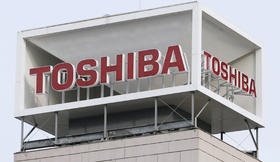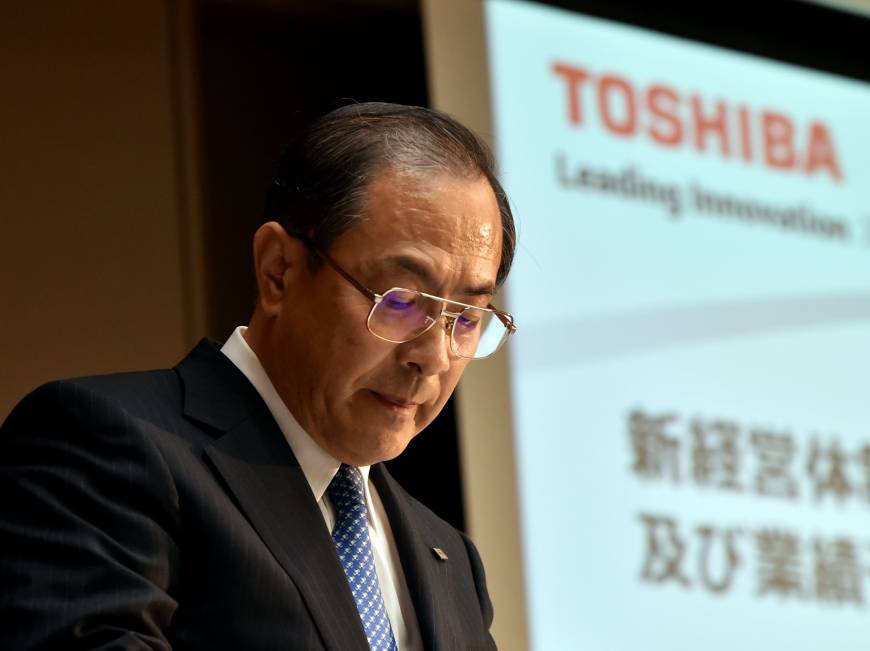 Toshiba Corp. has been subjected to almost daily press stories and analyses in the Japanese media on their continued struggles in the wake of a huge accounting scandal at the formerly blue-chip powerhouse company. The scandal was likely large in terms of financial losses, but even larger in terms of decimating the reputation of the company and its management. To turn the situation around, the company must start to build a new reputation for reliability. It isn’t going to be easy…
Toshiba Corp. has been subjected to almost daily press stories and analyses in the Japanese media on their continued struggles in the wake of a huge accounting scandal at the formerly blue-chip powerhouse company. The scandal was likely large in terms of financial losses, but even larger in terms of decimating the reputation of the company and its management. To turn the situation around, the company must start to build a new reputation for reliability. It isn’t going to be easy…
New President, new board, secret ballets…strange stuff…
The company is still conducting an investigation into the accounting scandal that brought down some of the most powerful and storied executives at the company in July. While investigators have already determined the company has fudged its numbers for years, at the direction of top company managers – what has not been determined is the exact number of misstatement and adjustment necessary to right the record.
It would seem that Toshiba is stepping up its communications with the media, perhaps in the hopes of rebuilding these important media relationships. In the wake of the scandal breaking, much of the media turned on the company who, it turns out, had been lying to them…as well as to investors and other stakeholders. The press has been particularly vicious with its reports, partly because of the realization it had been duped, and perhaps because Toshiba is the last company that anyone in Japan would have suspected of such misdeeds.
Company Will Lose Money
This week, Toshiba told the press that it is likely that the company will show a loss for the fiscal year that ended March 31, 2015. While tabulations are continuing, the company has not been able to close their books and report results for this most recent fiscal year.
Toshiba also made several other management and structural announcements as it seeks to set up a new, more responsible – and responsive – management team. New President Masashi Muromachi, who took over the post in July in the wake of the resignation of Hisao Tanaka on an interim basis, will now retain the title on a permanent basis. He certainly has his work cut out for him to force change on an old, entrenched way of doing business.

[Photo: Japan Times]
New Board of Directors
There was also a major change made to the board of directors, which shared the responsibility for the embarrassing accounting debacle. Originally a 16-member board, the new BOD has been reduced to 11 total members. Perhaps even more impactful – fully 7 of those directors, more than half of the board, will be from outside of the company in an obvious effort to provide more of a counterbalance to company managers on this oversight board. (Previously, only 4 of 16 directors were from outside the company, so this is a big shift in the balance of power to professional managers from outside the company.)
Not only that, but several of those new board members include very prominent names from the Japanese business community, including: Koichi Ikeda, former president of Asahi Breweries, Ltd., Yoshimitsu Kobayashi, former president of Mitsubishi Chemical Holdings Corp., and Shinzo Maeda, former Chief Executive Officer of Shiseido Co. These are prominent people from respected businesses with strong reputations for competence – clearly a strong signal for the financial and business communities.
“I apologize again for causing trouble to market participants and shareholders,” President Muromachi said to the press.
Bowing Very Deeply
He will probably continue to apologize, and bow deeply (a Japanese sign of contrition) for some time to come. The new board will officially take over their responsibilities after a special shareholders meeting in September.
Surprisingly, the company did not identify who would be the chairman for this all-new board. The press speculated that this was due to the fact that the company has been essentially scrambling to fill seats and will make that determination later.
Heated Discussions
But the Nikkei has reported the the “management revitalization committee” which was created to recraft the company management team, has been embroiled in “heated” discussions about who should chair the board of directors. Also, according to one of Japan’s top business news organizations, many on the committee did NOT want Muromachi to remain as ongoing company President. It seems that in a purge of management, Muromachi was, essentially, the last man standing and sort of fell into the role.
Perhaps aware of the internal controversy surrounding his ongoing presidency, Muromachi told the Nikkei, “After steering Toshiba out of the crisis, I will step down and make way for younger blood.”
Anonymous Employee Vote of Confidence on President
Yet another announcement – the likes of which we’ve never heard of at a company like Toshiba – has really caught our attention. Five directors will formed into a special “nomination committee” which will be charged with searching for and selecting future presidents. This committee will be made up exclusively of outside directors who, aside from selecting a president, will also begin regularly polling top company managers confidentially to take a vote of confidence on the sitting president.
According to the Nikkei, 120 senior company managers, including executive officers and heads of business units, will participate anonymously in the regular polls meant to be a further check on a company President’s performance. While the concept of reverse reviews is not common here in the US, it is a known technique used by some companies. But in Japan, we’ve never heard of any company employing the tactic. This could make for a very interesting shift in dynamics in the internal company culture.
Within the next few days, the independent investigating committee will issue their final judgment about the financial impact of the company’s accounting scandal. According to their preliminary findings, Toshiba management and employees improperly inflated company profits from fiscal year 2008 until December 2014 when the lid was blown off the scandal.
Big Numbers Will Get Bigger
The company has already said it will be hit with a ¥156.3 billion ($1.26 billion) profit write-down to adjust for the profit misstatement over those years. This week, the company has forecast an additional ¥56.8 billion revision ($452 million) to add in losses for the personal computer and semiconductor business units. That takes the current known total to ¥213 billion – and they’re still counting.
But wait, there’s more. The company also told the media this week that it is likely that the company will have lost money in the last fiscal year that is still being tabulated. On top of everything else, further write-down of asset values, high litigation expenses, and costs associated with withdrawing from certain businesses are expected to play a significant role in the final tally for last year. The Japan Times is estimating these charges to be ¥127 billion for further asset devaluation and ¥48 billion for added restructuring costs.
It looks like Toshiba faces a long road to recovery.
NOTE
To see our extensive coverage on the Toshiba accounting scandal, simply click “Toshiba” in the Tag Cloud in the sidebar on the right-hand side of your screen. Or you can alternatively type “Toshiba” in the Search Box on the right-hand side of the menu bar at the top of the page.





Leave a Reply